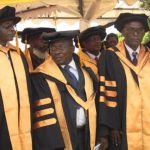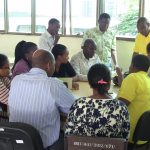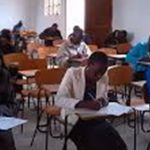Bachelor of Education Teacher Educator (Bed-TE)
The global world of today demands people to keep learning throughout their life span. The changes in technology, demand for regional and global integration, improvement in workplaces and improvement of livelihood in the communities; are some of the obvious manifestations of the need for continued training of educators with a focus on education, teacher education and more so on open and distance learning.
The BED-TE programme will combine all aspects of teaching and learning, with a view to developing professional teachers who will work to nurture and perpetuate learning for development of the nations and the world. The programme provides a strong balance of theoretical studies in education and practicum studies. Those who will attend this programme will be able to effectively perform as school teachers, education coordinators or even education officers.
The current teaching and learning environment is promoting student centered teaching and learning approaches against the former teacher centered approaches. Potential clients including those aspiring to be teachers, in-service teachers, ward education coordinators, district education officers (DEOs, WEO), classroom teachers, community educators etc will therefore benefit from this programme as it gives exposure of required changes in practice.
Programme Summary
Course Name: Bachelor of Education (Teacher Educator)
Course Initials: BED TE
Duration: Minimum 3 Years-Maximum 6 Years
Total Units: 34
Mode of Delivery: Blended
Programme Informations
OPTION I: Two principal passes in the following subjects: History, Geography, Kiswahili, English Language, French, Arabic, Fine Art, Economics, Commerce, Accountancy, Physics, Chemistry, Biology, Advanced Mathematics, Agriculture, Computer Science or Nutrition or Foundation Programme of the OUT with a minimum GPA of 3.0.
OPTION II: An ordinary diploma in education with a minimum GPA of 3.0
OPTION III: An applicant who satisfied Examiners in the Recognition of Prior Learning (RPL) Examination at an average of B Grade or above, and holding a valid RPL certificate (approved by TCU) shall be eligible for admission into relevant degree programmes.
OPTION IV: An applicant with degree or Advanced Diploma awards from other Institutions of Higher Learning will be considered on their own merit
LEVEL I
| CODE | COURSE TITLE | UNITS | TCU CREDITS |
| OCP 100 | Introduction to Computer | 1 | 10 |
| OFC 017 | Communication Skills | 1 | 10 |
| OEP 101 | Educational Psychology | 2 | 20 |
| OEF 101 | Philosophy of Education and Teaching | 2 | 20 |
| OEF 102 | History and sociological Aspects in Education | 2 | 20 |
| Courses from 2 Teaching Subjects | 6 | 60 |
LEVEL II
| OEI 101 | Curriculum Development and Evaluation | 2 | 20 |
| OET 200 | Teacher Professionalism and Classroom Practice | 2 | 20 |
| OEI 230-245 | Two Methodology Courses | 2 | 20 |
| OEI 208A | Teaching Practice | 1 | 10 |
| 3 Courses | Courses from 2 Teaching subjects | 6 | 60 |
LEVEL III
| OEP 309 | Introduction to Educational Psychology | 2 | 20 |
| OEM 201 | Educational Management and Leadership | 2 | 20 |
| OET 303 | Field Study | 2 | 20 |
| OEI 208B | Teaching Practice | 1 | 10 |
| Electives | |||
| Courses from 2 Teaching Subjects | 6 | 60 |
Electives for B.Ed-TE
| OET 301 | Curriculum Development and Teaching Models | 2 | 20 |
| OET 302 | HIV and Sexuality Education: Curriculum Based Approach | 2 | 20 |
A. General Fees for Bachelor Degree Programmes
| no. | Item | Local (Tshs) | EAC/SADC (USD) | NonSADC (USD) |
| 1 | Registration | 30,000 | 30 | 30 |
| 2 | Examination fees paid per paper (Test & Exam) | 10,000 | 20 | 40 |
| 3 | Students’ organization fees (annually) | 20,000 | 20 | 20 |
| 4 | Student identity card | 20,000 | 20 | 20 |
| 5 | Quality assurance fee | 20,000 | 20 | 40 |
B. Tuition Fees per Unit (or per 10 credits) for Bachelor Degree Programmes
| NO. | Item | Local (Tshs) | EAC/SADC (USD) | NonSADC (USD) |
| 1 | Theoretical course by distance mode | 60,000 | 40 | 80 |
| 2 | Theoretical Course by Face to face | 90,000 | 60 | 120 |
| 3 | Field Practice | 100,000 | 70 | 140 |
| 4 | Teaching Pratice | 100,000 | 70 | 140 |
| 5 | 5 Science Laboratory | 150,000 | 100 | 240 |
| 6 | Project/dissertation | 100,000 | 70 | 140 |
C. Other students’ direct cost
| No | Items | Costs |
| 1 | Purchase of books & Stationery | Tsh. 250,000 (US $ 250) |
| 2 | Science and Geography Practicals | Tsh. 260,000 (US $ 260) |
| 3 | Research paper | Tsh. 750,000 (US $ 750) |
| 4 | Teaching Practice | Tsh. 150,000 (US $ 150) |
| 5 | Attending Tests & Examinations | Tsh. 450,000 (US $ 450) |
| 6 | Total | Tsh. 1,860,000 (US $ 1860) |
NOTE: Students should make sure that they obtain control numbers for payment of all fees and obtain GePG receipts for all payments made from OUT Head Office or in our Regional Centre Offices. A part from total Fees paid to the University, students or their sponsors have to incur the following additional expenses (indicative only):
| s/n | Name | Contacts |
| 1. | Dr. Mary Ogondiek | mary.ogondiek@out.ac.tz +255 718 570 296 |
After completion of BED-TE programme a student should be able to:
1. Demonstrate professional qualities including being knowledgeable, resourceful, dependable, creative, organized, committed and high standard personal integrity.Develop strong and appropriate communication skills, critical awareness of classroom teaching and learning, management and problem solving skills.
2. Develop strong scholarship ability in understanding of global perspectives in education and design and delivery of classroom instructions.
3. Develop reflective teaching practice; and nurture collaborative working relationships with colleagues, senior educators and mentors.
4. Develop values of respect and honesty in engaging with the views of others in public settings
5. Develop knowledge, skills, competences and attitudes in the designing, developing, managing and evaluating educational programmes and projects.
- Each module carries 100% marks. The final examination counts for 70% of the total marks.
Coursework carries 30% of the total marks - A candidate shall not pass the course programme unless he/she attains a minimum of 40% (C)
in each module. - The mode of evaluation for the field practice/ teaching practice is 100%



